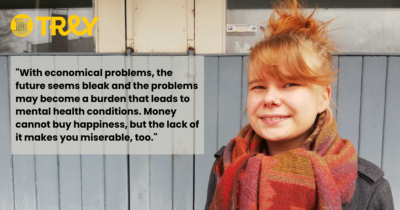Money is like a sixth sense without which you cannot make a complete use of the other five.
– W. Somerset Maugham
The public discussion is sometimes misled by the assumption that all of us students share a similar life situation and have the same problems. That is of course not true. Someone might be a single parent who is studying their second degree while someone else got quite a decent job already during the beginning of their studies. Someone has found a cheap apartment while someone else has a health condition that is expensive to treat. There are as many stories as there are students.
The accumulation of social problems means that the same persons or groups of people tend to have multiple issues. Societal problems become a part of individual life cycles and are connected to each other. Moreover, the students having mental health conditions are often those who find themselves in a difficult economic situation.
If one is struggling with money, it is not possible to practice self care. One might need to spend all their time thinking about how to pay the rent next month, or how to convince Kela of the need for social assistance, or where to find suitable winter shoes for the kid. With economical problems, the future seems bleak and the problems may become a burden that leads to mental health conditions. Money cannot buy happiness, but the lack of it makes you miserable, too.
The lack of finances may also affect friendships. It is difficult to talk about money, especially if you have to tell others that you cannot come to the movies this time either, because you cannot afford the movie ticket – not to mention the drinks after the movie. One might distance themselves from others due to the feelings of shame and lack of opportunities, which heightens the distress of a poor person. Thus, it does not come as a surprise that there is a link between loneliness and economical problems as well.

The standard of living is not always visible. As many find it difficult to talk about money openly, you must remain sensitive to this issue. Do not assume anything about others’ life situations, even if they are your close friends. Break the stigma. It might be a good idea to discuss the costs of joint activities among friends and to reflect if the activities are accessible to everyone.
A societal problem like this cannot be solved by individuals alone. The social security of students needs to be reformed and this message should also reach the tables in which the reform is discussed. The decision makers should listen to us students, otherwise many stories will remain unheard. Everyone – regardless of societal background and life situation – has a right to well-being and to feel safe during the studies. The work against poverty is work for better mental health.
During the week 19 we are having a theme week on students’ finances. There will be distance lectures about student’s livelihood, social security and entrepreneurship during the studies among other things. In addition you have a chance to hear what to do if you are struggling with debt. Stay tuned!